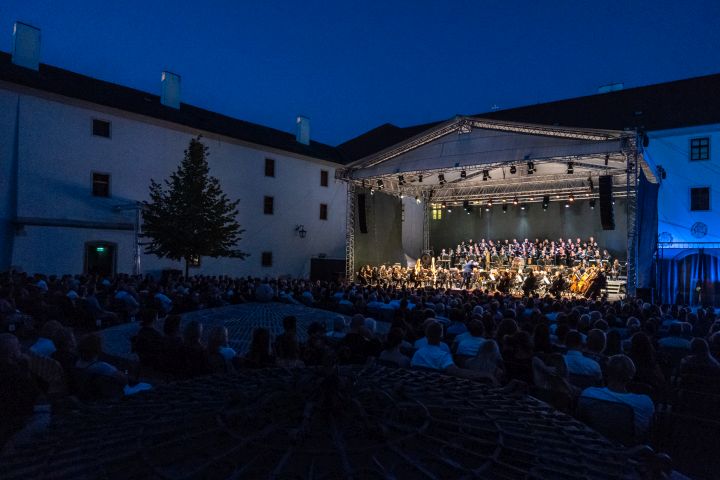The orchestra will begin the new season on 14 September with Mahler’s Symphony No. 2 “Resurrection” under the baton of chief conductor Dennis Russell Davies. Photo credit: Filharmonie Brno.
Brno, 7 May (BD) – Filharmonie Brno has presented plans for its 68th season, including established masterpieces, dramaturgical discoveries, and non-traditional projects by Czech composers. The programme will feature renewed attention to unjustly neglected composers, great monumental symphonies, and the marking of important anniversaries.
The orchestra will begin the new season on 14 September with Mahler’s Symphony No. 2 “Resurrection” under the baton of chief conductor Dennis Russell Davies. Right from the start, it thus continues the line of presenting great symphonic works by Austrian and German composers, including Wagner, Bruckner and Richard Strauss.
All of these monumental pieces, with the exception of the suite from Wagner’s Parsifal, will be conducted by Davies himself. “He is a world-leading expert on Bruckner and the other mentioned composers,” said Marie Kučerová, director of the Filharmonie Brno.
The central theme of this season is the Year of Czech Music, which the orchestra will celebrate with several projects throughout 2024. One of the more traditional ones is a concert of Dvořák and Suk & Martinů, which will be performed by two outstanding representatives of the younger generation of Czech performers: violinist Jan Mráček and conductor Robert Kružík. The Rhapsody in Blue 100 concert with works by Schulhoff, Gerschwin and Korngold is a slightly atypical tribute to Czech music. The name of the concert refers to the 100th anniversary of the premiere of Gershwin’s popular work, whose symphonic jazz had a significant effect on Schulhoff, among others.
“This contribution to the Year of Czech Music poses rather provocative questions, for example whether we are willing to accept Schulhoff, a German-Jewish native of Prague, whose mother tongue was German, but who actively supported Czech musical culture,” explained the dramaturg of Filharmonie Brno, Vítězslav Mikeš. “Or the Brno native Korngold, who left Brno at a young age and developed his work under completely different influences. The question is where the boundaries are for what we call Czech musical culture.”
Another unconventional contribution to the celebrations is the Bedřich Smetana 200 project, combining the compositions of the founder of Czech national music with Liszt and Wagner, who fundamentally influenced his work. Smetana will also be remembered at the birthday concert of chief conductor Davies. With his partner in life and art, Maki Namekawa, he will perform “My Homeland” in Smetana’s arrangement for four-hand piano.
“We will supplement it with visualisations by Cori O’Lan from Ars Electronica,” said Davies. “In the summer, we will visit places which are significantly related to the history of the Czech Republic in order to collect footage for visualisations.”
Smetana will be performed once more during the season – in the unique project In the Orchestra, in which listeners can sit directly among the musicians during the concert.
In anticipation of spring and peace, a concert combining Jan Novák’s Spring Symphony with Antonín Rejcha’s New Psalm will be performed. It combines two seasonal lines, a tribute to Czech music, and a conceptual care for lesser-known composers.
“After all, we released Rejcha as well as Novák in a new edition of our recordings and we would like to continue doing so. It’s music that definitely deserves to be performed on world stages,” said Mikeš.
Together with these composers, Alfred Schnittke, the Estonian Lepo Sumera, and Mieczysław Weinberg will all be performed in the new season. Among world soloists, the orchestra will welcome tenor Christoph Prégardien, violinist Alexander Sitkovetský, soprano Martina Janková and harpsichordist Mahan Esfahani.
“The latter will perform in all three compositions in one evening. As the leading voice of Krás’ Chamber Music, as a solo instrumentalist accompanied by the orchestra in Poulenc’s Concerto champêtre, and in the concert part of Weinberg’s Seventh Symphony,” said Kučerová.
Conductor Michael Schøenwandt will also return to the orchestra to perform Sibelius’ Symphony No. 1, Tomáš Netopil with a combination of Rachmaninov, Mahler and Schnittke, Alexander Liebreich with Krása, Poulence and Weinberg. Among the new conductors this season will be Takeshi Moriuchi, who will play the piano in Adams’ composition Eros Piano.
After a highly successful American tour, the orchestra will next year visit South Korea, as well as prestigious stages in Austria, Germany and Poland. “For example, we will go to summer festivals in the Rheingau, Grafenegg and the Vienna Konzerthaus,” said orchestra manager Pavel Šindelář. Domestic audiences can hear Filharmonie Brno in Ostrava, Valtice, České Budějovice and Smetana’s hometown of Litomyšl.
Tickets for the new season go on sale on Monday, 29 May at 12 noon. Season ticket holders can renew their subscription online or at the Filharmonie Brno pre-sale. All extraordinary concerts and tickets for the Špilberk Festival will go on sale on the same day. On Monday, 19 June, sales will begin of all non-renewed season ticket seats, tickets for Moravian Autumn and also Tailor-made Seasons.
“People can now set up a 30% discount on three concerts. The principle is that the more concerts they choose, the more benefits await them,” said Kučerová.
As in previous seasons, the orchestra offers ten subscription series: two large ones in the Janáček Theater (Oslavná, Temperamentní), one in the Besední dům (Noblesní), and a series of chamber, extraordinary, family and jazz concerts. There is also a cycle of orchestral academics Mladá krev and concerts of the Kantiléna choir.
The full programme for the 68th season of Filharmonie Brno can be downloaded as a pdf here.






